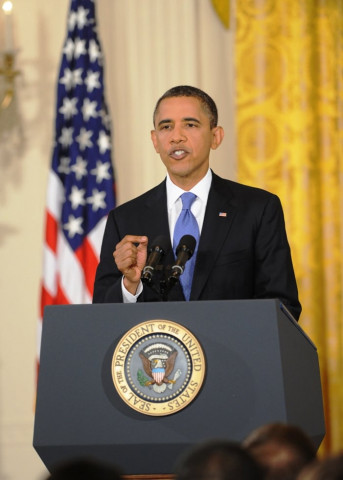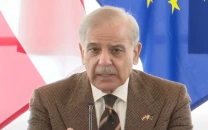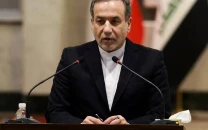Obama announces Iraq troop pullout by end-2011
After nearly nine years US lost more than 4,400 troops, and expenditure of hundreds of billions of dollars.

The decision came after Iraq failed to agree to legal immunity for a small residual force the United States had hoped to keep in the country to train the army and counter the influence of neighboring Iran, officials said.
After nearly nine years, the deaths of more than 4,400 US troops, tens of thousands of Iraqis and the expenditure of hundreds of billions of dollars, Obama said the last American soldier would leave with his head held high.
"Today I can report that, as promised, the rest of our troops in Iraq will come home by the end of the year. After nearly nine years, America's war in Iraq will be over," Obama said at the White House.
"I can say that our troops in Iraq will definitely be home for the holidays," said Obama, who rose to power in opposing the unpopular Iraq war and pledged as a presidential candidate to withdraw all US troops.
Obama's predecessor George W. Bush invaded Iraq in 2003, arguing that its then leader Saddam Hussein was endangering the world with weapons of mass destruction programs. After Saddam was toppled, such arms were never found.
US troops soon became embroiled in a bitter insurgency, swelled by incoming Al-Qaeda fighters, and the tide of the war only turned when now retired General David Petraeus convinced Bush to mount a troop surge strategy.
Obama made the announcement after holding a video conference with Prime Minister Nuri al-Maliki, which US officials said included a moving tribute by the Iraqi leader to US troops who died in his country.
US defense officials said talks on a future US military mission had collapsed over the question of legal protections for American troops.
"That is a red line for us," said one official, who spoke on condition of anonymity."
Obama said that despite the failure, US defense officials would still seek ways to help train Iraqi forces, as they do for many other nations.
The president's announcement to end the war in Iraq fulfilled a central promise of his 2008 election campaign, which took place at a time when the Iraq war was still a painful fault line in US politics.
It also came after his credentials as commander-in-chief, bolstered by the killing of Osama bin Laden and top Al-Qaeda suspects, were further enhanced by the death of Moamer Kadhafi after a NATO mission in support of Libyan rebels.
But Republican presidential candidate Mitt Romney accused Obama of presiding over an "astonishing failure to secure an orderly transition in Iraq" which put at risk victories won through the sacrifice of American soldiers.
"The unavoidable question is whether this decision is the result of a naked political calculation or simply sheer ineptitude in negotiations with the Iraqi government," he said.
"The American people deserve to hear the recommendations that were made by our military commanders in Iraq."
The US withdrawal provokes a number of questions about Iraq's future, including:
-- Are the Iraqi military and security forces up to the job of safeguarding security gains made over recent years?
-- How will Iran seek to expand its influence in Iraqi politics?
-- Is Iraq's fledgling political system robust enough to survive?
-- Will disputes between Kurdistan and Baghdad drive a deeper wedge between the autonomous region and the central government?
Obama administration officials declined to say whether the war had been worthwhile.
"History is going to have to judge that," said Vice President Joe Biden's national security advisor Tony Blinken, who argued that vibrant politics in Iraq would be part of the US legacy.
Maliki, who Obama invited to the White House in December, said in a brief statement that he and Obama were on the same page on the withdrawal.
"The two points of view of the two leaders were the same, of the necessity of beginning a new phase of strategic relations after carrying out the withdrawal at the specified date at the end of the year," he said.
The 39,000 remaining US troops in Iraq must withdraw by the end of the year under an accord between the two countries reached during the Bush administration.
Obama placed the withdrawal from Iraq in the context of efforts to transfer responsibility for security to Afghan forces and the stepped-up US battle against Al-Qaeda in Yemen and Pakistani tribal areas.
"I would note that the end of war in Iraq reflects a larger transition. The tide of war is receding," he said.


















COMMENTS
Comments are moderated and generally will be posted if they are on-topic and not abusive.
For more information, please see our Comments FAQ